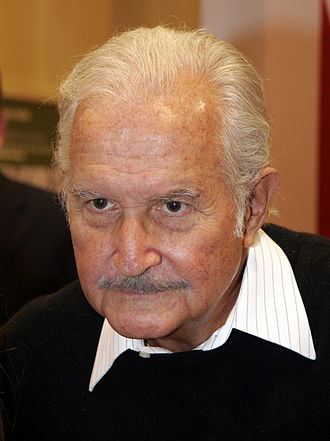La Muerte de Artemio Cruz - Carlos Fuentes
How do the opening quotes of the book relate to the themes and/or structure of the book? (Content and form)
“La préméditation de la mort est préméditation de liberté". —MONTAIGNE, Ensayos
“Hombres que salís al suelo
por una cuna de hielo
y por un sepulcro entráis,
ved cómo representáis…” —Calderón, El gran
"Moi seul, je sais ce que j'aurais pu
faire... Pour les autres, je ne suis tout au
plus qu'un peut-etre". —STENDHAL, Rojo y negro
"... de mí y de Él y de nosotros tres ¡siempre tres!..." —GOROSTIZA, Muerte sin fin
"No vale la vida: la vida no vale nada". —Canción popular mexicana
"A C. Wright Mills, verdadera voz de Norteamérica, amigo y compañero en la lucha de Latinoamérica". —Carlos Fuentes
First, it is important to know that La muerte de Artemio Cruz is divided not in chapters, but in the most important dates of the protagonist's life. Those dates do not have an order, but each of them includes both, important flashbacks of him and his "actual" opinion after remembering them. It is also important the fact in which Artemio's opionions are expressed, because they are narrated in 1 out of 3 ways: You, I and Him, which relatively represent the future, the present and the past of himself. So I could relate the green quote that says: "... from me and from him and from the three of us ¡always three!..." with this part of the structure, because in the book somehow the 3 narrators always connect with each other.
The red quote says: "The premiditation of death is the premeditation of freedom". According to Merriam Webster dictionary, premeditation is the consideration or planning of an act beforehand that shows intent to commit that act, so when I read this quote, I think about the moment in which Artemio was already sick, knowing that he would die. During the reading, we can observe how Artemio prepares prepares and cosiders his death by remembering all of those important days. He wanted to be in peace with himself before dying, so that is why he is clarifying and forgiving himself in the text, and that is the reason I relate this quote with this case.
Also, I think the orange quote could be related to thie previous case, because it says "Men who come out on the floor, for an ice cradle, and you enter through a sepulcher, see how you represent..." and I think that Artemio had the perceived a lot of things while he was sick, he was feeling his emotions, listening to the conversations in the room, he was feeling pain, he was remembering everything important to him, and I think that represents strenght, because in spite of all the physical or psychological pain he was feeling, he was able to feel freedom and peace in his soul.
The yellow quote says: "Me alone, I knew I could have done it... But for others, I am only a little human being". I relate this quote with the toughts that Artemio had with himself, as he, during the reading, felt powerful by conquering some girls, by being the general of a troop, etc. And, for example, when he already was sick, we can observe how his family see him as a weak person that can not do anything, whilst he is feeling guilt of have not been a greater person or of not have did the things that he could have done by taking advantage of the power he had.
The blue quote says: "Life is not worth it: life is worthless". And it is a Mexican song, which also says "it always starts crying and so, crying, it finishes". What I can say about this one, is that at the end of the reading we can notice that both, the death and the birth of Artemio, are narrated, so I relate this quote with the logical and simple process of life. In spite of all of the happiness that Artemio received, he could not die happy, we was so in pain that Carlos Fuentes connect Artemio's birth with his death, as he in both was suffering for something. And while he was dying, he realizes that no matter what, people die.
The purple quote says: "To C. Wright Mills, the real voice of North America, friend and partner in the battle of Latin America". C. Wright Mills was an american sociologist and he focused on the intelectuals' responsability after WW2 in which he includes 3 main topics: economy, politics and military. Carlos Fuentes dedicated this book to him, because he really admired him, as we was a really brave person who did so much for his country and nobody noticed it. In fact, Artemio's life is similar to C. Wright Mills' life.
Carlos Fuentes (Panama, November 11 1928 - México, DF., May 15 2012) was a Mexican novelist and essayist. Among his works are The Death of Artemio Cruz (1962), Aura (1962), Terra Nostra (1975), The Old Gringo (1985) and Christopher Unborn (1987). In his obituary, The New York Times described Fuentes as "one of the most admired writers in the Spanish-speaking world" and an important influence on the Latin American Boom, the "explosion of Latin American literature in the 1960s and '70s", while The Guardian called him "Mexico's most celebrated novelist". His many literary honors include the Miguel de Cervantes Prize as well as Mexico's highest award, the Belisario Domínguez Medal of Honor. He was often named as a likely candidate for the Nobel Prize in Literature, though he never won.

References:
- S. (2012, May 18). Carlos Fuentes, entonces y ahora. Retrieved February 23, 2019, from https://www.sophosenlinea.com/2012/05/18/carlos-fuentes-entonces-y-ahora/
- Cervantes, I. (2012, May). Carlos Fuentes. Biografia. Retrieved February 23, 2019, from https://www.cervantes.es/bibliotecas_documentacion_espanol/biografias/praga_carlos_fuentes.htm
- https://en.wikipedia.org/wiki/Carlos_Fuentes
